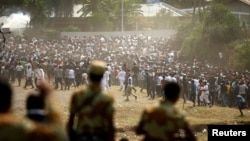The United Nations human rights chief said on Thursday he would push Ethiopia to allow his agency to investigate rights abuses during months of unrest in 2015 and 2016 in which hundreds of people were killed.
The Horn of Africa country declared six months of emergency rule in October after more than a year of violent protests in its Oromiya and Amhara regions. Demonstrators in the areas say the government has trampled on their political rights. The state of emergency has since been extended by four months.
Last month, a government-sanctioned investigation said 669 people had been killed in the violence.
Speaking to journalists during a three-day visit, U.N. High Commissioner for Human Rights Zeid Ra'ad Al Hussein said there was a "clear need for a much wider and freer civic space" in Ethiopia.
"Although I benefited greatly from the briefings provided to me by the Attorney General's office, the extremely large number of arrests “over 26,000“ suggests it is unlikely rule of law guarantees have been observed in every case," he said. "I believe my staff ought to be given access to the affected areas, and I renew my request, so we can assess the situation and ascertain what further support can be given to the authorities, including justice officials."
Ethiopian authorities say a crackdown on the unrest was necessary because "elements" from Eritrea and Egypt whipped up much of the violence, including attacks on farms and factories, by protesters with legitimate grievances.
Since imposing emergency rule, government officials have repeatedly refused access for international investigators, saying they would undermine Ethiopian sovereignty.
Ethiopia is an important Western ally against Islamist militants in neighboring Somalia as well as an increasingly important economic player in a unstable region.
Ethiopian leaders have pledged to carry out political reforms. In October, President Mulatu Teshome Wirtu acknowledged that Ethiopia had to broaden democracy given the complete lack of opposition deputies in its 547-member parliament.
Zeid said he planned to pay a return visit in January and expressed hope that he would secure permission by then.
In its report, the Ethiopian Human Rights Commission said 462 protesters and 33 security personnel were killed in unrest that engulfed 91 towns in the Oromiya region alone. The protesters opposed having their land incorporated into the boundaries of the capital Addis Ababa.
In the Amhara region, 110 demonstrators and 30 police officers died in clashes sparked by the arrest of activists campaigning over disputed territory, it said.
The report said another 34 people died in the SNNP region which lies to the south of Addis Ababa.





